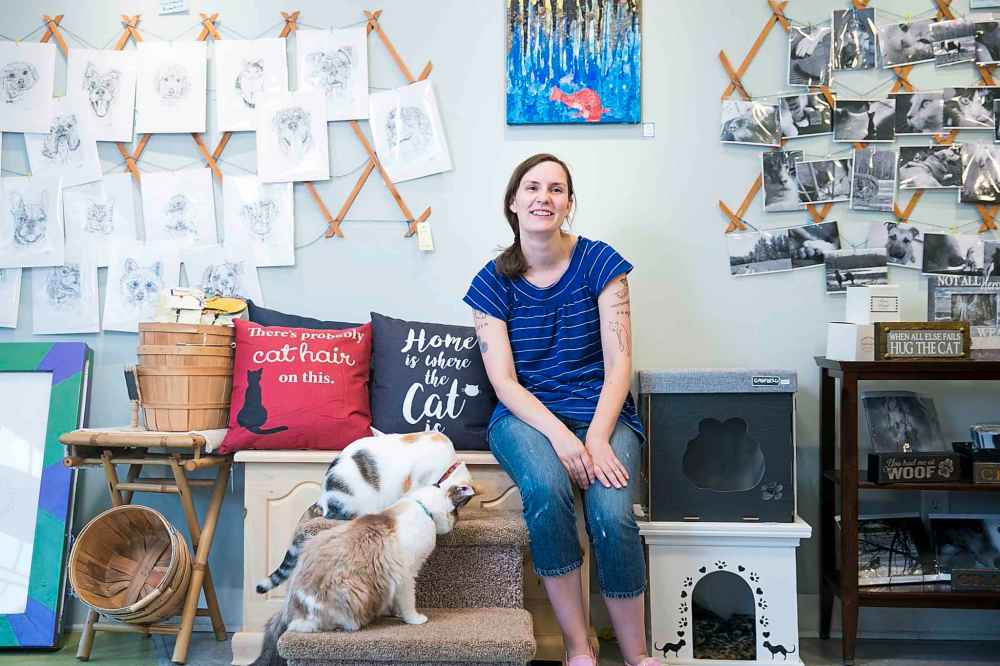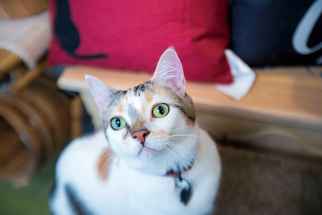Elmwood neighbourhood is home to the most licenced cats per person in Winnipeg
Read this article for free:
or
Already have an account? Log in here »
To continue reading, please subscribe:
Monthly Digital Subscription
$0 for the first 4 weeks*
- Enjoy unlimited reading on winnipegfreepress.com
- Read the E-Edition, our digital replica newspaper
- Access News Break, our award-winning app
- Play interactive puzzles
*No charge for 4 weeks then price increases to the regular rate of $19.00 plus GST every four weeks. Offer available to new and qualified returning subscribers only. Cancel any time.
Monthly Digital Subscription
$4.75/week*
- Enjoy unlimited reading on winnipegfreepress.com
- Read the E-Edition, our digital replica newspaper
- Access News Break, our award-winning app
- Play interactive puzzles
*Billed as $19 plus GST every four weeks. Cancel any time.
To continue reading, please subscribe:
Add Free Press access to your Brandon Sun subscription for only an additional
$1 for the first 4 weeks*
*Your next subscription payment will increase by $1.00 and you will be charged $16.99 plus GST for four weeks. After four weeks, your payment will increase to $23.99 plus GST every four weeks.
Read unlimited articles for free today:
or
Already have an account? Log in here »
Hey there, time traveller!
This article was published 11/07/2018 (2707 days ago), so information in it may no longer be current.
More licensed cats live in the north end purr capita than they do anywhere else in Winnipeg.
Of the tens of thousands of cats in the city, pet owners in the Elmwood neighbourhood have more licensed cats per population than any other area, according to the city’s Animal Services Agency.
Winnipeggers in the northeast pocket — home to about 15,000 people — owned 949 licensed felines last year. That works out to about six cats for every 100 residents.

"We’re definitely a dense population for humans; our community and our houses tend to be close together and cats are a very popular pet, so with a lot of people comes a lot of cats," said Jessica Thompson, a north end resident and community outreach liasion for the Winnipeg Humane Society.
The second place neighbourhood with the highest count was just across the Red River, where there were just under six cats per 100 people in 2017. In total, there were 1,677 licensed cats in East Point Douglas; no other region in the province had a licensed feline tally higher than that.
Winnipeggers who live in those neighbourhoods, and all over the city, own felines because they are easy to care for compared to other animals like snakes and parrots, fairly inexpensive and the furry friends are perfect for "someone who just likes to enjoy cuddles and purring and playing," said Thompson, who has two cats at home.
Most of those cats are domestic shorthair or longhair breeds, she said, adding she meets a Siamese mix in the north end every once in a while.
Despite the high numbers in comparison to other areas in the city, (there are just over 4 licensed cats per 100 people in River Heights and around 2 in Linden Woods, for instance) Thompson said the numbers are lower than they should be. She estimates there are thousands of cats unregistered in Elmwood alone between felines with owners, strays and the feral cats roaming around.
"There’s obviously some work to be done there, but that’s OK. We don’t give up," Thompson said.
The city charges $50 per year to license a cat, or $15 annually if the animal is spayed or neutered.
All dogs and cats over six months old have to be licensed by the city under the Responsible Pet Ownership bylaw. Pet owners who don’t obtain or renew their pet’s license annually can face a fine of $250.
Thompson runs the CARE Cat Community Outreach Program, a non-profit organization that advocates for spaying and neutering cats in the north end. The organization targets both Elmwood and East Point Douglas, along with Transcona, because she said those neighbourhoods have a "history" of cats not being fixed and unspayed litters.
Jennifer Laferriere, owner at Miss J. La’s Fur Babies Cat Cafe and adoption centre, said it was interesting to hear those two neighbourhoods had high license rates compared to the others.
"Those are parts of the city that are more populated with stray cats than others," said Laferriere, whose business is located a short drive north from East Point Douglas and Elmwood.
The public education Thompson does in the north end is what she said she thinks has contributed to the higher license numbers compared to other parts in the city. Some of the money from the city’s licensing fees goes towards funding program’s like hers. Alongside the Winnipeg Humane Society, she said she can arrange for cats to be spayed and neutered for $5.
"Some people decide not to license their cats because their cats either stay indoors or they don’t want follow-up fees or things like that; the only follow-up fee is the continual cat licensing fee… and even if your cat is indoors, they should be licensed.
"Cats slip out all the time, accidents happen, you don’t plan on losing your cat, but having a cat license will get your cat returned to you and ensure you don’t have any fines."
maggie.macintosh@freepress.mb.ca
Twitter: @macintoshmaggie

Maggie Macintosh reports on education for the Winnipeg Free Press. Funding for the Free Press education reporter comes from the Government of Canada through the Local Journalism Initiative.
Our newsroom depends on a growing audience of readers to power our journalism. If you are not a paid reader, please consider becoming a subscriber.
Our newsroom depends on its audience of readers to power our journalism. Thank you for your support.







